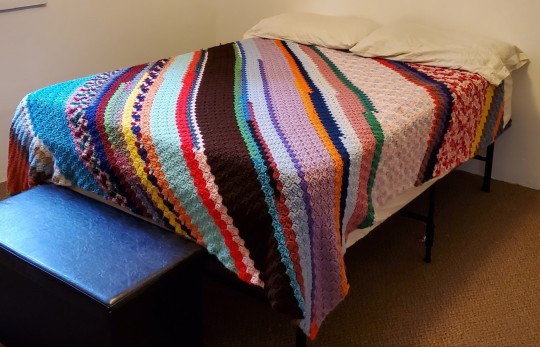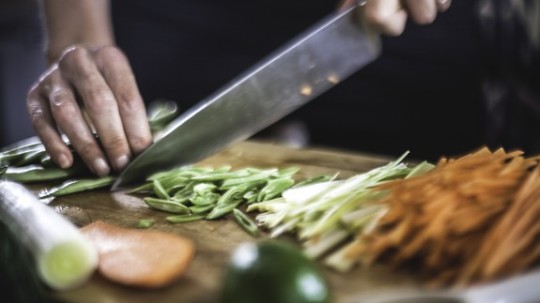#there are so many good sources on this topic but abbie knits was the most simple and clearly layed out i could find
Text
I had three goals going into 2022: Not add to my stash, to use up what I have, and to make sustainable decisions with my fiber art moving forward.
Nearly eight months in, and I have not bought any new yarn this year! I also completed a huge passion project of mine: using up ALL of my acrylic yarn and pledging to only purchase environmentally friendly options moving forward.
This blanket (affectionately nicknamed The World's Ugliest Blanket) is made from the remainder of the synthetic fiber in my possession and will be the last of its kind.

Microplastics shed by acrylic yarn harm both marine and terrestrial life. Personally, I don't want to continue contributing to the problem. You can read up more on how microplastics harm our environment on Abbie Knits blog here if you're interested in the topic!
#no tea no shade to those who use acrylic and will continue to do so it's just not something i want to continue doing!#a lot of acrylic yarn is gifted/donated to me so i had enough to make a queen sized spread 😬#i know acrylic is the most affordable option but if you can afford to throw a couple more bucks into a project the planet will thank you#sustainability#yarn#crochet#long post#fibrespace#there are so many good sources on this topic but abbie knits was the most simple and clearly layed out i could find#we don't talk about microplastics from acrylic yarn enough!!!
288 notes
·
View notes
Text
Stop shaming recipe bloggers for writing a lot

Every so often, someone will act very angry online because a recipe they clicked on has "too much text." They wanted to make mushroom ravioli, but instead had to scroll through a bunch of words about what mushroom ravioli means to a blogger's family. Boring!
It's true that many (if not most) food bloggers write long narratives preceding their recipes. Sometimes, they explain how they developed the recipe. Other times, they share why they chose to post this particular food, or explain the modifications they've made to accommodate family members with dietary restrictions. They might share a story about the dish providing them comfort in a difficult time, or how cooking the dish with a loved one healed a broken relationship. Food is personal, after all; it comes with stories.
So why do so many people rush to mock them?
Cadry Nelson, a food blogger who runs the vegan website Cadry's Kitchen, includes narratives with her recipes regularly. (She's also written an essay about recipe narratives.) This is partially because she wanted to document her transition to veganism, the context in which she developed much of her work. In doing so, she'd create a reference point for readers curious about going vegan themselves.
"I was trying a lot of produce I’d never had before, as well as re-creating old familiar flavors but without meat, dairy, and eggs," she explained in an interview. "I didn’t have many other friends who were vegan at that point."
View this post on Instagram
This summer it will have been 9 years since we loaded up all of our belongings into a U-Haul & moved across country from Los Angeles back to Iowa, where David & I were born & raised. On the way, we stopped at FUD restaurant in Kansas City. The restaurant is gone now. But they were known for their raw dishes & jackfruit recipes. I especially loved their jackfruit Reuben. I figured it was high time I made my own version. The jackfruit is pink from beets. It’s topped with homemade #vegan Thousand Island dressing, @goldminenaturalfoodco garlic kraut, and beautiful marbled rye from @newpioneercoop. Get the recipe on the blog. Link in profile. #vegansofiowa #vegansofig #veganfoodporn #reubensandwich #veganreuben #whatveganseat #vegancomfortfood #vegansandwich #foodporn #foodphotography #foodstagram
A post shared by Cadry Nelson (@cadryskitchen) on Feb 7, 2019 at 10:46am PST
Sharing this information doesn't just benefit her readers, either. It also helps her secure a place in the saturated food blog realm. "Through these posts, I’ve gotten to know bloggers’ flavor preferences too," Nelson said. By sharing stories on blogs, people get to know the types of foods [and] flavors that specific recipe creators enjoy. You figure out who is a good match for your own palate."
So why do people have such an issue with people writing about their own food? It seems to come down to convenience. Generally, perturbed readers complain that it takes too long for them to scroll down to the recipe itself.
Historian Kevin Kruse, for example, tweeted his disdain for recipe narratives last weekend: "Hey, cooking websites?" he wrote. "I don't really need a thousand words about how you discovered the recipe or the feelings it evoked for you ... I'm trying to feed my family. No need to curate the experience for me."
SEE ALSO: Why the '15-minute recipe' sets you up to fail
"GIMME THE RECIPE HON MY SCROLL FINGER HURTS," tweeted Chelsea Peretti last November.
Admittedly, it is irritating when anything is difficult to find on the internet, especially when we've come to expect an easy-as-pie user experience from every app and every website. It can feel like a slog to scroll through paragraphs of text when all you want is a list of ingredients.
But the thing to interrogate here isn't necessarily whether blocks of text are annoying — it's why people think these particular blocks of text don't deserve to exist.
Nelson thinks there's an element of sexism to the critiques she sees about recipe writing. Home cooking is still a deeply gendered pursuit, and writers whose work centers on home cooking are still perceived as less professional, less valuable, and less worthy voices. "The feeling seems to be that they don't think these writers have something of value to offer," Nelson said.
There's been high-profile backlash to the backlash against recipe narratives. After Kruse's tweet, Smitten Kitchen creator Deb Perelman tweeted a thread on the matter, encouraging recipe writers to "write as long and as in-depth as your heart desires about recipes and anything else they drum up in your mind and ignore anyone who says you shouldn't."
1. These websites are free to read and free to not read. /3
— deb perelman (@debperelman) February 16, 2019
2. It's mostly women telling these stories. Congratulations, you've found a new, not particularly original, way to say "shut up and cook." [I just don't see don't see the same pushback when male chefs write about their wild days or basically anything. Do you?] /4
— deb perelman (@debperelman) February 16, 2019
3. Not that you asked, but I love context, both in the recipe's development and the way it knits into your life. I wish more people who cooked got to tell their stories. /5
— deb perelman (@debperelman) February 16, 2019
Like Nelson, she also called out detractors' casual sexism. "Congratulations, you've found a new, not particularly original, way to say 'shut up and cook,'" she tweeted. "I just don't see don't see the same pushback when male chefs write about their wild days or basically anything. Do you?"
"I wish more people who cooked got to tell their stories," she added.
There's also a more technical element at play where recipe narratives are concerned: search engine optimization (SEO). Recipe bloggers want to catch the attention of the illusive Google algorithm — and, ideally, land their recipe on the coveted first page — so they must demonstrate "authority" in their field. This means more comprehensive content, which is really hard to pull off with a concise recipe alone. (Tons of people will be using the phrase "apple crumble," for example, but only you can write your own story about it.)
"When I’m writing, I try to tell a story that has a hook as well as please[s] the Google algorithm," Nelson said. "I do keyword research ... I see what kinds of questions people have around the topic, and look for ways to anticipate their problems, and answer their questions, so that they will have a successful cooking experience. Lately, I’ve been adding more step-by-step pictures of how to make dishes, as well as videos, because Google says that readers want that."
Even though she's noticed people criticizing lengthy posts, Nelson maintains that writing a lot — authoritatively, of course — is what's going to get eyes on her recipes. "People say they want shorter posts, but Google values information," she said. "It’s hard to give information without using some words along the way."
SEO and marketing experts agree that Nelson's approach is a smart one, especially in such a saturated landscape. "Because a recipe usually consists of a listing of ingredients and steps, it’s often very difficult for a search engine to discern what this article is trying to convey," Pete Herrnreiter, who is the VP of digital strategy at The Motion Agency, explained via email. "By developing a richer upfront with background on the dish ... it [helps to] define the post."
Content strategist Abby Sanders, who works for Von Mack Agency, also emphasized the advantages of differentiating one's recipe from the pack. "These days, search engines are pretty effective at determining whether a page can serve as an 'expert source' on a specific query," she said. "So any additional content that includes certain keywords, as long as it's coherent and well-written, will improve that page's ranking."
View this post on Instagram
Who'd have thought two such aggressively wholesome ingredients could taste so exceptional together? To be honest, not me. But we come back to this again and again whenever we are looking for a hearty vegetarian meal because it tastes like a luxury, not a compromise, especially heaped on grilled bread. [Spinach and Chickpeas on smittenkitchen.com or linked in profile]
A post shared by smitten kitchen (@smittenkitchen) on Feb 19, 2019 at 9:10am PST
As a caveat, Sanders mentioned, there are "plenty of other factors that play a role in rankings, such as domain authority, links to that page, and the list goes on. But from a sheer content standpoint, it does make good sense for a food blogger to write some extra, interesting copy around their subject."
So, fine. Finding a list of chili ingredients would be easier if we didn't have to scroll. But recipe bloggers are writers, and they have stories to share that are poignant, funny, and valuable — even if you (and I) don't love every single one you read. And if you really don't like the narratives? There are plenty of places for you to find story-free recipes online, though you might have to pay for a subscription to see some of them. Also, cookbooks exist.
"My food blog is my own. It’s my creative space. I spend a lot of time testing the recipes, taking photographs, making videos, and writing my stories," Nelson said. "If people aren’t interested in any aspect, so be it."
"My blog is Cadry’s Kitchen. It’s literally the place where I cook," she added. "I don’t know why I would write myself out of it."
WATCH: What happens to your body when you eat spicy food?

#_category:yct:001000002#_uuid:2fa419ed-0e61-3bf7-b8cc-5ae1f1bc6278#_lmsid:a0Vd000000DTrEpEAL#_author:Chloe Bryan#_revsp:news.mashable
0 notes